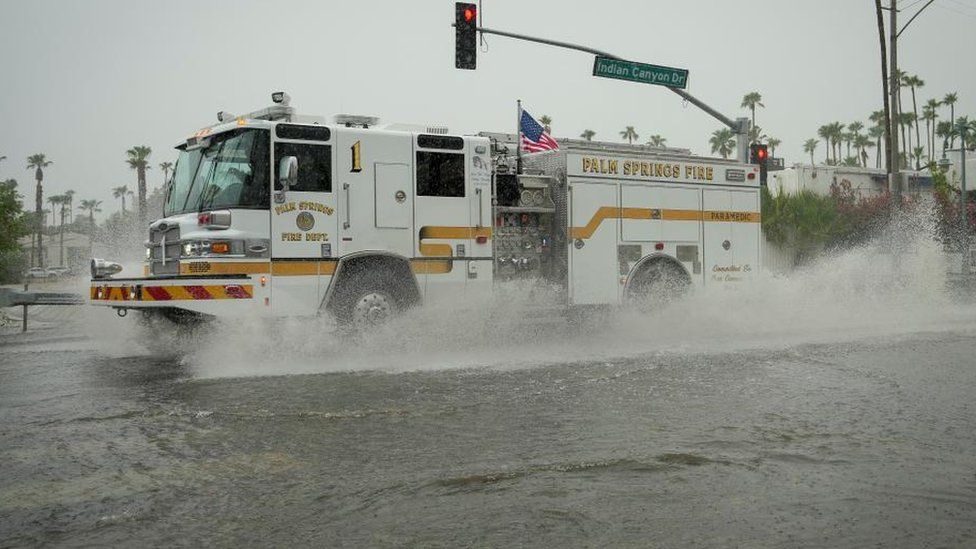Earthquake shakes parts of California during storm
- Published

As people across Southern California sheltered from Storm Hilary, another natural disaster hit - a magnitude 5.1 earthquake.
Its epicentre was north-west of Los Angeles and #hurriquake was soon trending on social media.
It did not cause major damage, and the hurricane has also since been downgraded to a post-tropical cyclone.
Los Angeles Mayor Karen Bass said over 100 fire stations were checking buildings for damage.
Ms Bass said in a tweet that there were no initial reports of structural damage caused by the earthquake or any injuries.
Seismologist Dr Lucy Jones told NBC news it was "interesting" to have the earthquake near Ojai, and was the "first time we've had a five since 1932 in exactly this location, and even within the Ventura basin".
Two aftershocks followed the initial quake, measuring a magnitude 3.1 and 3.6.
Dr Jones warned more aftershocks were likely over the next few days.
The quake hit at the same time as post-tropical cyclone Hilary, which left some residents unsure where they should seek cover.
BBC News reporter Regan Morris said she was walking her dog when her phone's emergency alert system went off.
One of her neighbours ran out of his house in a panic saying he didn't know where to go and she could hear other people shouting inside their homes as the quake struck.
Another video from inside a supermarket showed items fall from the shelves as the tremor struck, as a man ran with his daughter from the shop.
Compared to previous earthquakes, Sunday's earthquake was relatively moderate. A magnitude 6.7 quake that hit a northern Los Angeles neighbourhood in 1994 released 125 times more energy than the Ojai earthquake.
Meanwhile, the National Hurricane Service said the "ongoing and historic" amount of rain caused by the storm was expected to cause life-threatening and locally catastrophic flooding, as well as potential mudslides and landslides.
California Governor Gavin Newsom declared a state of emergency across most of southern California, with more than 7,500 troops deployed to help people prepare for the storm.
Residents in San Bernadino county were evacuated due to the intense rainfall, and the National Weather Service warned of life-threatening flooding in Ventura county after almost 2in (5cm) of rain fell within two hours.
Videos shared to social media by San Bernardino county showed rainwater wash rocks on to roads, as trucks drove through the mud.
‘Tinder dry’ California now ‘sodden’: BBC reporter
The storm caused heavy rain in areas that are usually arid desert. Experts warned those areas were more susceptible to flash flooding, as the ground would struggle to absorb the water.
That played out in areas like the desert city of Palm Springs, which recorded its heaviest hour of rain ever, Mr Newsom said.
Parts of Death Valley, notorious for having some of the hottest temperatures on earth, were also flooded by intense rainfall.
Tropical storms are unusual in the area because dry air, cool water and wind conditions off the coast tend to suppress hurricanes.
Related Topics
- Published1 day ago
- Published19 hours ago